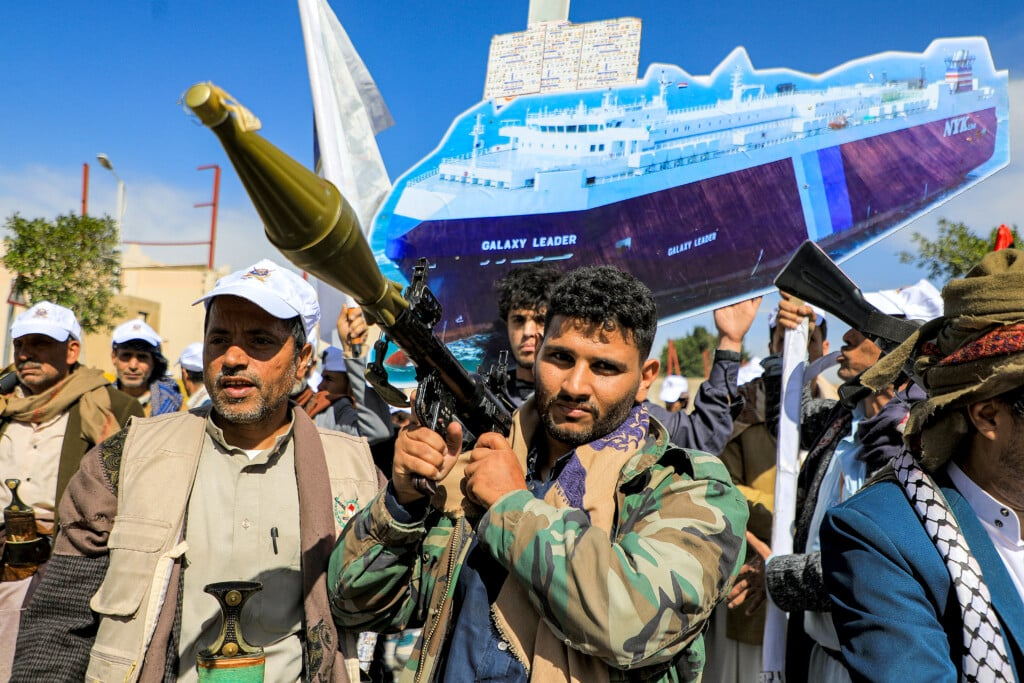The international community which should have prevented Hamas from controlling Gaza in the first place, has looked on as Iran then set in motion wars across the Middle East.
The Iranian-backed Houthis’ successful attacks on two ships in the Red Sea, in which crew were harmed and ships left adrift, illustrate how the international community has completely failed in its obligations.
Iran decided to operationalize the Houthis after the Hamas attack on Israel. The same international community that should have prevented Hamas from controlling Gaza in the first place has looked on as Iran then set in motion wars across the Middle East.
First, let’s survey the recent news. On June 13 and June 14, the Houthis attacked two commercial ships, the bulk carrier Tutor, which was making its way to Aqaba in Jordan, and cargo ship Verbena, which was en route to Venice. Both ships were attacked twice and the crew had to abandon ship.
There is no other place in the world that exists in the kind of Hobbesian chaos of the Middle East, where countries can back militia-terrorist groups that take over states and then attack ships or launch thousands of rockets. There are other areas of the world where there are terrorist groups, such as Boko Haram in Nigeria, that spread massacres and destruction, but the Middle East is unique in the power of these groups.
For instance, Hamas constructed hundreds of kilometers of tunnels and stockpiled more weapons per capita than most countries. It also launched thousands of rockets at Israel. Hezbollah then joined the war on October 8, launching thousands of rockets, anti-tank missiles, and drones at Israel. There has been no condemnation by the UN or others of these endless attacks. Iran, emboldened by pushing Hamas and Hezbollah into a war that affected millions in Gaza, Israel, and Lebanon, then pushed the Houthis in Yemen to begin attacking ships.
This began in October and November. It has ebbed and flowed in terms of the Houthi “success” at hitting ships. The US partnered with the UK and other countries to try to protect shipping. However, it is obvious that the US has now settled into the same routine that Israel settled into with Hezbollah. US Central Command, which is the on-scene command for securing the Red Sea and shipping lanes, has carried out some strikes with partner forces on the Houthis. However, the Houthis continue their attacks. This is because the “response” is so small and proportional that it doesn’t harm the Houthis’ capabilities.
The recent attacks have increased the danger to shipping in the Red Sea and Gulf of Aden. “On June 12, Iranian-backed Houthis struck M/V Tutor, a Liberian flagged, Greek-owned and operated bulk cargo carrier, with an uncrewed surface vessel (USV) resulting in severe flooding and damage to the engine room. One civilian mariner remains missing following the attack. The crew abandoned ship and were rescued by USS Philippine Sea (CG 58) and partner forces. M/V Tutor remains in the Red Sea and is slowly taking on water,” US Central Command said.
US Central Command said on June 13 the Houthis struck the “M/V Verbena, a Palauan-flagged, Ukrainian-owned, Polish-operated bulk cargo carrier in two separate missile attacks. Today [June 16], at approximately 1:45 p.m. (Sanaa time), the crew issued a distress call indicating they were abandoning the ship. M/V Anna Meta responded to render assistance. Anna Meta has recovered the mariners and is transporting them to safety. The crew abandoned ship due to continued fires and an inability to control them.”
US Central Command said Iranian navy frigate Jamaran was only eight nautical miles from the Verbena when it was struck. It didn’t respond to the distress call. The real story may be that the Iranian ship played a role in this attack. Like many things in this conflict, Iran often has ships snooping around and nothing is done against them while Iran’s proxies attack commercial ships. It shows the complete impunity enjoyed by Iran in fueling this crisis.
These attacks are increasing and there is no solution put forward by the international community to stop them. This shows how incapable the international community has become in terms of protecting shipping. It also is not a positive development amid tensions between Israel and Hezbollah.
Recent concerns being floated by numerous countries and international organizations about the possibility of a war between Israel and Hezbollah illustrate how there is no real attempt to stop the Hezbollah attacks. Iran has basically taken upon itself a new “right” in the region to spread attacks from Lebanon to Yemen, over an arc of thousands of kilometers, in which it operationalizes proxies to launch thousands of rockets at Israel and attack ships.
In a world where a rules-based international order worked, Hezbollah and the Houthis would face pushback. Today, Iran’s proxies primarily do as they want and Israel suffers and the crew of commercial ships suffer. The recent attack on two ships is a major blow to shipping and will further erode confidence that the US and other countries can secure the shipping lanes.
Reports at China’s Xinhua on June 15 that “two warships of the Russian Pacific Fleet will participate in joint naval exercises with the Egyptian Navy in the Mediterranean Sea,” further illustrate how Russia may be taking advantage of the situation.
“According to the ministry, a group of combat ships from the Pacific Fleet, including the missile cruiser Varyag and the frigate Marshal Shaposhnikov, has left for the Egyptian port of Alexandria to engage in the joint exercise with the Egyptian Navy,” the report said. Russia also sent warships to Cuba recently.

